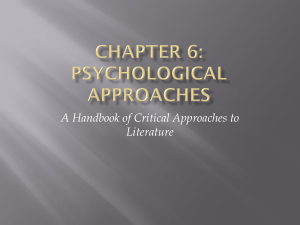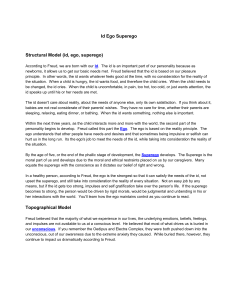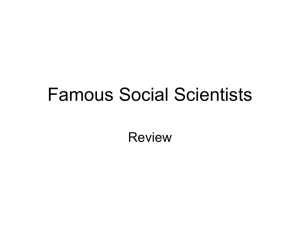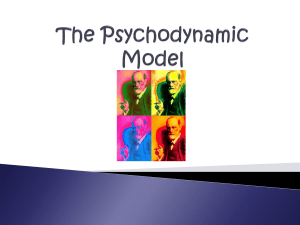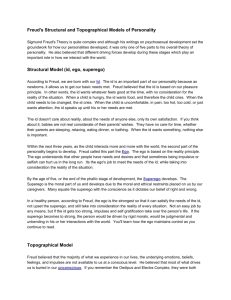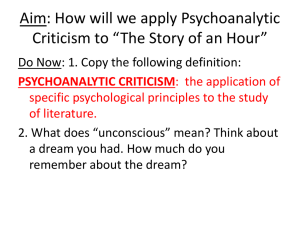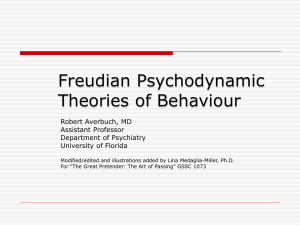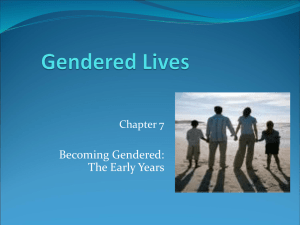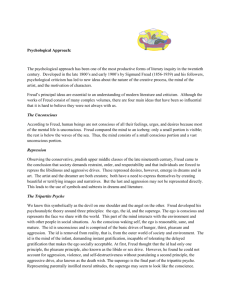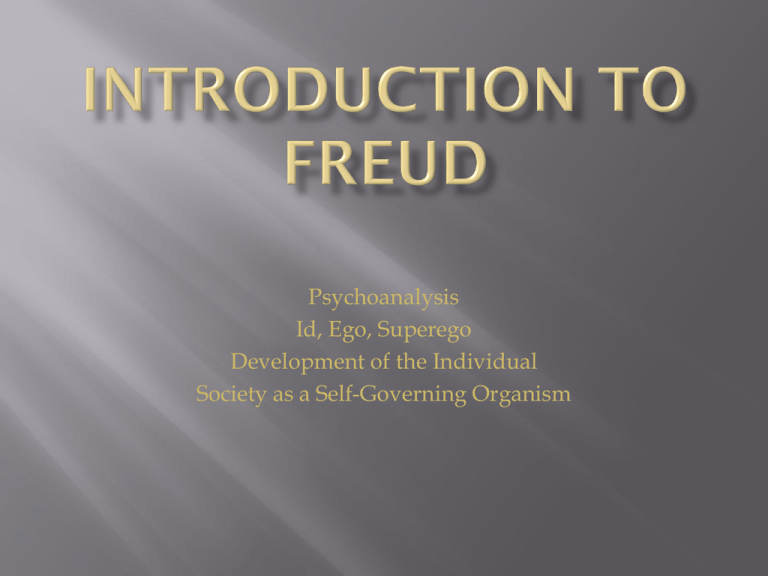
Psychoanalysis
Id, Ego, Superego
Development of the Individual
Society as a Self-Governing Organism
Sigmund Freud Born May 6, 1856
One of 8 children, Jewish family
Age 4, Freud’s father moved family to Vienna,
Austria
In the last years of his life to London (to avoid
Nazi persecution)
Psychoanalysis: “The Talking Cure” therapy
that investigates the workings and interactions
between conscious and unconscious mind.
Think of: “revealing,” “unearthing” what we
have hidden, repressed, in order to become
healthy.
The image of the therapist’s couch is from
Freud’s practice where patients would lie as
Freud interrogated them
Freud: We have a tri-partite (three-part) self
Id – That most infantile and demanding part of the self that is
insatiable; ruled by the “Pleasure Principle” that aims to find
pleasure and avoid pain
Ego – The part of the self that battles against the Id and Superego
with reason, logic, and rationale; ruled by the “Reality Principle”:
You can’t always get what you want; helps the Id make it until
urges/desires can be satisfied
Superego – Unreasonably abuses you for shirking your
responsibilities and not living up to your potential; contains rules
concerning what constitutes good or appropriate behavior as well
as standards concerning what constitutes bad, immoral, or
embarrassing behavior
Conflict Model: The self is NOT UNIFIED; it
is not a coherent, singular entity. We’re not
entirely rational, not entirely in control
There are competing elements within
ourselves.
No way to resolve competing elements; the only
way to stay healthy is to not let any one of
them “get the upper hand” or sickness (i.e.
neurosis or psychosis) can occur.
If, as an adult, your Id is too dominant? (very
self-absorbed, don’t care about others, only out
for yourself)
If, as an adult, your Ego is too dominant?
(distant, rational, efficient, unemotional, cold)
If, as an adult, your Superego is too dominant?
(guilt-ridden or sanctimonious).
Plato saw the self as tripartite (three components)
Reason (>> ego)
Spirit/conscience (>> superego)
Desire (>> id)
Plato believed reason could
and should rule the
personality
REASON keeps desires in
check and uses them to
motivate
Freud’s
viewpoint is that
reason can never
control the
passions
We are driven by
unconscious
instincts we can
never possibly
know
Knowledge of
the self is beyond
reason
Marx = father of the
communist revolution
Historical evolution,
Marx believed, would
usher in communism –
we would create a
rational, just system (as
opposed to the unjust
system of capitalism)
Therefore, logic and
rational thinking will
overcome the illogic of
capitalism
Freud says Marx is
idealistic and utopian
“Our basic needs are not
benign needs”
Our deepest needs are
aggression, the willful
desire to hurt, and seek
domination, and
ultimately our own selfdestruction
Thus war, cheating
businessmen,
mercenaries, etc.
Three stages of development early in life, all
centered around seeking pleasure
Oral
Anal
Phallic
Mouth, lips, and tongue are primary erogenous zones.
When feeding, the child experiences pleasure; when the
mother takes away the breast/bottle, child experiences
displeasure
If one develops an oral personality:
Can be dependent/needy as adults.
If fixation on oral satisfaction occurs after the child has
teeth this may result in excessive aggression as an adult.
Adults who smoke or drink excessively, or who
constantly put their hands over their mouths may have
oral personalities
Child becomes interested in cleanliness;
experiences pleasure and displeasure through
exerting self-control and control over the parent.
Most children are being toilet trained at this time.
Traumatic toilet training may result in fixation
and an anal personality.
May be excessively orderly, stubborn or generous,
depending on how their toilet training progressed.
Occurs when the child is approximately 6 years old.
This stage is often labeled as “sexist” b/c of its focus on
the male.
Freud claims females experience penis envy – feelings of
jealousy and inferiority develop (Freud would have loved the
feminist movement)
Oedipus Complex – occurs in the later part of the
phallic stage; children at this age develop an attraction
to their opposite-sex parent.
Children repress their desire for their oppositesex parent; they realize that they will never have
them as long as the other parent is around.
Upon resolution the child begins to identify with
the same-sex parent.
Desires replaced with “healthy” love for
parent/family
Development of the superego.
Child adopts values and standards of the parents.
REVIEW: Our base instincts are repressed as
we deal with the Oedipal Complex
NOTICE: Life requires our base instincts be
pushed down in order to become functioning
members of society
QUESTION: If we’re all essentially violent,
sexual beings, then why isn’t there anarchy?
For Freud, the Id desires pleasure through sexual
satisfaction; therefore, we all desire to find acceptance
from the opposite sex
In order to be accepted by another, we must act in a
way to attract others; therefore, we must act desirably
We “behave” so we can attract others to satisfy us
If we do not behave, we are separated from society –
something we cannot accept b/c we can’t find
satisfaction when we’re put in jail (banished)
Our LAWS and societal rules help keep our instinctual
desires in check
RELIGION keeps us in check through the threat of
GUILT
Some people throw their energies into work,
others into hobbies
These distractions help us keep our desires in
control and focus our energy that would
otherwise seek an unacceptable outlet
These distractions help society evolve by
developing technologies, for example
Man can’t just go around doing whatever he wants all
the time – he values acceptance in order to gain sexual
gratification, and besides, his actions would destroy
society
He gains acceptance by doing something “acceptable:”
going to school, earning a degree, working hard
The individual may, by working and through hobbies,
develop new techniques and technologies
Thus by sublimating his instincts, he helps society
evolve
Note that the Id exists
exclusively in the unconscious.
The Ego and Superego battle to
keep the Id in check. Likewise,
the Ego battles with reason
against the unreasonable
demands of both the Id and the
Superego.
Top of the iceberg: Conscious mind
(smallest part – say, 10%). We can
access this, we are aware of this part
of “us.” We understand it logically.
Middle of iceberg: Preconscious (medium size,
about 10-15%). Ordinary memory. You don’t
keep a lot of information in your conscious
mind all the time – why?
If you need to know something (where you
parked your car, your sister’s birthday, your 7th
grade Stardust Dance, etc.) you can bring it
“up”) to your Conscious mind.
Bottom of iceberg: Unconscious (huge – dwarfs
the other two, 75-80% of our mind).
“Underwater”
The unconscious: Plays a very large role in how
we function as human beings. Most of the work
among the Id, Ego, and Superego happens
here.
A “dumping ground” for all of our desires,
anxieties, urges, especially those which are
painful – why?
Nothing in the unconscious goes away. Even if
we aren’t aware of it, what is in the
unconscious influences us every day in every
way.
Can’t directly or easily access the unconscious
with conscious mind. “Speaks” a different
language (ex. Dreams).
Freud, Sigmund. A Note upon the “Mystic Writing-Pad,” General
Psychological Theory. New York: Simon & Schuster, Inc., 1991.
_______. The Ego and the Id. (Trans. Joan Riviere.) New York: W.W.
Norton & Co., 1960.
Lecture Notes, Professor Debra Bergoffen, Department of Philosophy and
Religious Studies, George Mason University, 1994.

